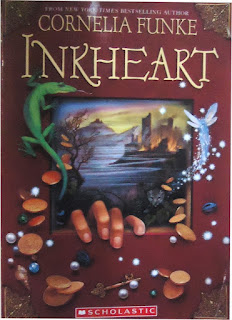I read a blurb about Inkheart somewhere online in which the writer said his daughter put down (one of the books in) the Lord of the Rings to read this book instead.
I was impressed.
I shouldn't have been.
The girl may have found Inkheart more interesting simply because it was easier for her to read. I've read both; LOTR does require more devotion.
That doesn't mean that Inkheart is all that good however. In fact, I'm surprised that a movie was made of it. I wonder how much they had to add to the movie to make it even moderately interesting. (Or maybe it isn't.)
I like the premise of this book. The main characters are able to read characters out of books, transferring them from their fictional world into ours. In exchange, someone from our world goes into theirs.
My main problem with the book is how slowly it moves. There are entire chapters - pages long - that could have been chopped down to a sentence or two with no loss of plot line or action. There's far too much description of what a character is thinking or wondering about. It adds nothing to the story.
The editor had one thing to do and failed to do it.
Another complaint is the lack of suitable explanations for important things that happen. For example, the "reading out" of characters is almost completely uncontrollable throughout most of the story. Yet near the end, it happens virtually on command. How come?
One of the main characters, a girl named Meggie, lost her mother years ago. Her father, Mortimer or Mo or Silvertongue - depending on who's talking, won't tell her was happened to her. Spoiler alert: She got "read into" a story by her husband. Meggie's mother appears in this book as "Resa" (real name, Theresa), but she can't talk. Why not? (There's sort of an explanation, but it's really lame.)
Meggie and Mo (as Meggie calls him...never "Dad") have an adult friend named Elinor whose characterization is extremely poorly done. Is she nice or mean? Why is she nice sometimes and mean at other times - to the same people? She is way too inconsistently presented.
At the end of the book, most of the evil characters who had been "read out" of another story - also called Inkheart - are sent away, apparently for good.
But not all of them. Why not? Other than so that there can be a sequel to this story, there's no real reason.
I'm not going to read the sequel to find out. I wish I would have stopped reading this many-hundreds-of-pages-long book before the end, but I kept going for your sake - so you won't have to make the same mistake as me.
You're welcome.
